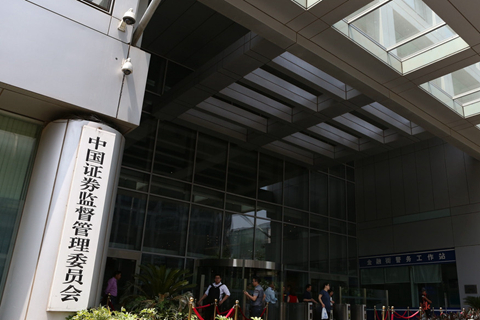China Further Tightens Screws on Entrusted Loans

China is further cranking up its scrutiny on “entrusted loans,” channels that have been used for massive asset management funds to invest in risky borrowers outside the formal banking system.
Entrusted loans – in which a bank acts as an intermediary to arrange and administer financing between a borrower and lender – have become one of the main segments of the country’s “shadow banking” industry.
The China Securities Regulatory Commission has ordered a ban on investing collective asset management plans — investment pools managed by brokerages for as much as 200 retail investors — into entrusted loans, trust loans and other non-standard credit assets, separate sources told Caixn.
Non-standard credit assets refer to debt-financing instruments that are not traded in either stock exchanges or the interbank market.
The Asset Management Association of China (AMAC) has stopped registration for new collective asset management plans targeting credit assets, sources close to the matter said. Existing products won’t be extended after maturity, said sources.
The CSRC also required brokerages to closely examine their customers of targeted asset management plans for credit assets investment — which are managed by brokerages for one specific customer — to ensure the funds are not raised from the public. Brokerages are not allowed to guarantee yields and repayments for such products.
The securities regulator’s move reflects regulators’ tightening scrutiny over entrusted lending activities.
In an entrusted loan, companies provide financing to each other with banks acting as intermediaries to earn a fee. China first permitted entrusted loans in 2011 as a way of reducing lending risks for banks and boosting their fee income while helping companies obtain loans. But in reality, the practice has been increasingly used as a channel for massive asset management funds to invest in highly leveraged products or risky borrowers, accumulating bad loan risks outside the formal banking system.
Last week, the China Banking Regulatory Commission announced a set of sweeping new rules to control such lending by commercial banks, amid rising concerns that banks were using entrusted loans to shift debt off their balance sheets and to circumvent curbs on lending to industries such as real estate and to local government financing vehicles.
Industry analysts said the recent moves of banking and securities regulators reflect financial regulators’ coordinated efforts to curtail the rampant growth of shadow lending activities.
In November, the People’s Bank of China and the banking, securities and insurance watchdogs jointly released an overarching regulatory framework for the country’s $15 trillion asset management industry. The new regulations are set to be fully implemented in mid-2019 after a consultation period.
“There has been the rule that brokerages and fund management firms should not invest asset management plans into credit assets, but it hasn’t been taken seriously in the past,” said a brokerage manager. “The latest rules spell out restrictions to comply the upcoming asset management regulations,” he said.
Data from AMAC show that by the end of November 2017, outstanding value of collective asset management plans managed by securities firms totaled 4.35 trillion yuan ($670 billion), while value of targeted asset management plans exceeding 25 trillion yuan.
Contact reporter Han Wei (weihan@caixin.com)

- 1Cover Story: China Carves Out a Narrow Path for Offshore Asset Tokenization
- 2Drownings Shake Chinese Enthusiasm for Travel to Russia
- 3Over Half of China’s Provinces Cut Revenue Targets
- 4Li Ka-Shing’s Port Empire Hit by Forced Takeover Amid Panama Legal Dispute
- 5In Depth: China’s Mutual Fund Industry Faces Overhaul After a Banner 2025
- 1Power To The People: Pintec Serves A Booming Consumer Class
- 2Largest hotel group in Europe accepts UnionPay
- 3UnionPay mobile QuickPass debuts in Hong Kong
- 4UnionPay International launches premium catering privilege U Dining Collection
- 5UnionPay International’s U Plan has covered over 1600 stores overseas






